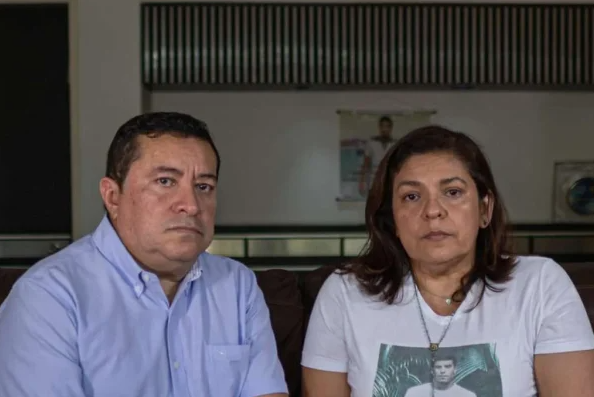The Complex Humanitarian Emergency that affects Venezuela continues to have a differentiated impact on women. For example, gender-based violence continues to increase in the country, where 201 femicides were registered between January and September 2023 alone.
The organizations that promote and defend the rights of Venezuelan women have expanded their capacities to support women in their communities. However, the responsibility and obligations rest with the Venezuelan State. This situation has also impacted women’s rights defenders and the Venezuelan feminist movement.
Red Naranja, a network of organizations and individuals who advocate women’s rights, spoke to a group of activists who expressed their experiences as defenders of women’s rights and shared their different realities and perceptions.
For Verónica Arvelo, director at Entretejidas, heading a women’s rights organization has been her most challenging professional experience and a deeply rewarding one. The work of leading a feminist organization involves a constant fight for women’s rights, gender equality and social justice in Venezuela’s complex context.
One of the main challenges faced by women’s rights organizations is the resistance and opposition of those who do not share our vision of gender equality. There are deep-rooted cultural, social and political barriers that hinder the advancement of feminism in Venezuela. The lack of understanding and support on the part of conservative and sexist sectors of society also hinders the advancement of women’s rights in the country.
Activist Mayela Carrillo describes her experience as nourishing and challenging, especially when she started to set up an organization more than 30 years ago, which required applying her academic knowledge and establishing the approach of her organization. She became empowered by traveling to different communities and studying her surroundings. Then she witnessed the transformation of the initial challenges into new ones as she became able to identify the problems and walk along the communities, from the expertise of her organization.
Beatriz Mora shared that challenges persist with public institutions due to re-victimization, procedural delays and the slow process for filing a complaint.
Luisana Angulo believes that sisterhood and healthy, affectious and effective communication are positive traits of organizations. She speaks on behalf of Uniandes, an NGO led by women that also incorporates the participation of men who are sensible of the topic and exercise a gender-based approach, which is extremely important for their work.
On the other hand, Hermanlyg Ríos pointed out that her experience has been immensely enriching and positive. One of the challenges she has faced has been balancing her role as an activist and human rights defender with her professional and family life.
María Alejandra Pérez said that her experience has been one of personal and professional growth that has allowed her to work for a better country. However, she also faces challenges every day, such as encouraging reporting in a country where the justice system is not completely impartial or independent.
Risks and adversities faced by defenders
Venezuelan civic space currently faces different threats and restrictions, as indicated by Civicus. This situation has a differentiated impact on Women’s rights defenders who face different challenges and risks. Verónica Arvelo indicated that they face threats, harassment and violence from State and non-state actors who seek to silence their voices and discourage their work of advocacy.
In this context, Beatriz Mora explains that the leaders of the organizations have often felt distressed by the increase in persecution, vulnerability and unsafety as the activity of civil society organizations is continuously criminalized by the Venezuelan State. As part of the differentiated impact, the women leaders claim to fear for their families and themselves. However, they take security measures and do not let the fear paralyze them but rather drive them to act in a fully aware, collective and articulate manner.
Besides harassment on social media, Verónica Arvelo is also worried about her safety and the well-being of her team and collaborators, but she remains committed to the fight for justice and equality.
Mayela Carrillo also identified different risks. She is convinced that people should exercise critical thinking and express their opinions, but she has been under attack in different spaces for her ideas.
On the other hand, Beatriz Mora and Luisana Angulo commented that they experience other safety risks in areas along Venezuela’s borders, such as threats due to situations of trafficking in women and from the aggressors in cases of violence. They also report the presence of irregular armed groups in the vicinity of the communities where their organizations hold workshops and support groups.
Women’s rights defenders often feel sad, exhausted and/or helpless by the situations that affect Venezuelan women but lack an immediate solution. They want to be able to achieve gender equality in the country, which is a very complex challenge that faces many obstacles.
The bright side of the defense of women’s rights is the articulation of activists and organizations who walk hand in hand through different processes to achieve justice and objectives, including the protection of women victims of violence so that they feel safe and shielded.
Is it possible to be a mother and a feminist in Venezuela?
For Mayela Carrillo, being a woman, a mother, and a defender is a great journey because it made her question her paradigms, tear them down and deconstruct herself into a new person. She redefined what it means to be a mother and a feminist woman who seeks spaces of equality. In the process of getting to know herself, she took her own hand to walk with her children and her different roles in the community.
Hermanlyg Ríos shared her experience, which brings her satisfaction and joy. However, she also carries significant challenges that involve balancing her professional and family responsibilities with the demands of activism and the promotion of human rights.
As a feminist, she had dealt with and confronted gender stereotypes and prejudices in her personal and professional environment. “Assuming these roles of mother, feminist and defender is a source of personal empowerment and an opportunity to contribute to the construction of a more just, inclusive and equitable world for all people. Furthermore, it is important to remember that taking care of myself is essential to be able to take care of other people and continue fighting for their causes,” Ríos concluded.
Women who lead NGOs and the access to financing
Mora shared her concern regarding access to financing for local organizations. In the case of the Proidheas Foundation, all the work is done ad honorem, which makes the sustainability of the organization a major challenge.
On the other hand, Arvelo warned that economic precariousness and lack of resources are constant obstacles to carrying out initiatives and programs in favor of women’s rights. In consequence, the scarcity of funds limits their capability to carry out awareness-raising, education programs and activities to support women in vulnerable situations.
Faced with challenges, Women act as a network
The reflections of the activists who make part of Red Naranja are very valuable. Arvelo noted that she feels that it is essential to remain vigilant, supportive and resilient in the face of the adversities and risks that they face in their daily work.
“I am aware of the multiple challenges of the context, but I am also aware of the importance and urgency of our work as feminists. Some days I feel a little frustrated because there is still a lot of work to do, and other times I feel grateful and proud when I see that I manage to bring the message to other people and when I manage in one way or another to help other women find a voice of their own,” Arvelo concluded.
Mora concluded by expressing that defenders work tirelessly, day by day so that women can live in a world free of violence, which she hopes can one day be a reality.
Translated by José Rafael Medina




